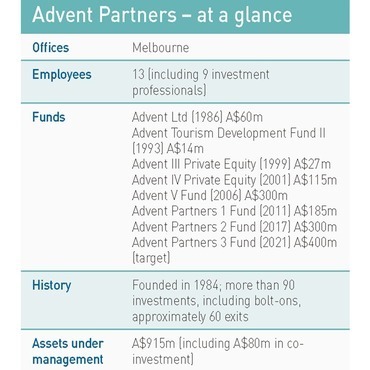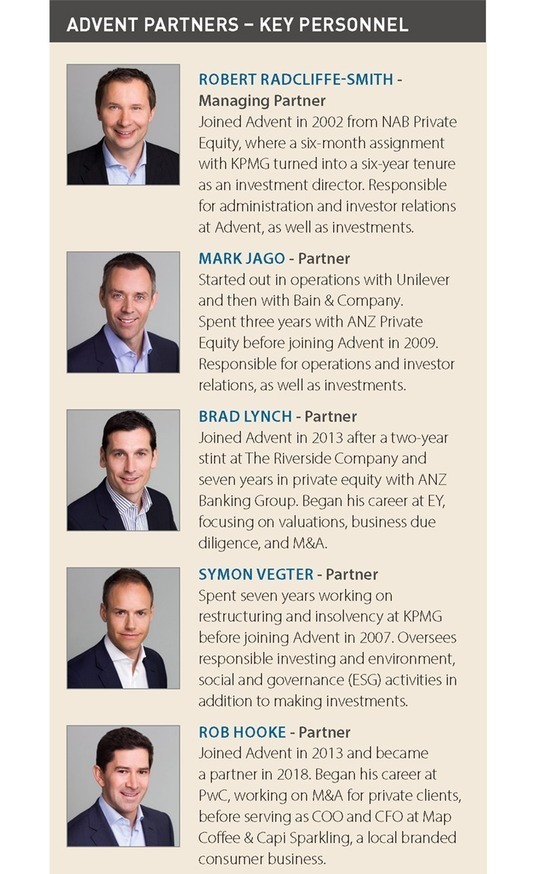
GP profile: Advent Partners

Having spent the first half of the last decade undergoing a renewal in terms of leadership and strategy, Australia’s Advent Partners believes it has emerged stronger, smarter, and more focused on the future
The acquisition of Zero Latency AR, a Melbourne-based provider of hardware and software used in free roam virtual gaming to a global customer base, made it five technology deals out of seven in Advent Partners' seventh fund. The sector didn't even feature in Fund VI.
COVID-19 played a role in this shift. The private equity firm instinctively turned cautious in 2020. Enterprise technology companies that sell into robust industries, typically on a worldwide basis, were prioritized. Two other opportunities, one involving medical products used in elective surgery and the other a consumer business subject to the vicissitudes of volatile demand, were declined.
At the same time, rising technology exposure – the first couple of deals in Fund VIII are likely to be in the sector as well – represents the culmination of a years-long strategic repositioning. Once a generalist in Australia and New Zealand's lower middle market, Advent now exists on a diet of technology and healthcare, supplemented by consumer and education.
"When we shifted to those sectors, we put a lot more effort into business development, mapping the market and conducting proactive research. Then COVID made us lean a bit," says Mark Jago, a partner at Advent. "We are tracking close to 200 businesses and most are software technology companies. That didn't happen overnight. We meet them, we maintain dialogue, learn about them."
Every investment since 2013 has fallen into one of the four sectors, a graduation from the traditional foundation stones of Australia's economy to the industries that will define its future. This coincided with a similar transition of power within Advent itself, from the older generation to the new.
Advent closed its seventh fund at A$300 million ($217 million) in 2018, matching the sum raised in pre-handover Fund V, the implication being that LPs fully endorsed the strategy and personnel changes. Fund VIII, which is currently in the market, has already raised A$350 million against a target of A$400 million. Yet the journey from Fund V to Fund VI was protracted and at times bumpy.
Going to market with a new leadership team was not the only challenge. With Australia's institutional investor community in a state of flux circa 2011 and future commitments to private equity uncertain, Advent could no longer rely on its traditional heartlands. For the first time in its history, the firm had to target overseas LPs.
"We hit a perfect storm. It was hard work, raising that fund. And we dropped from A$300 million in the previous vintage to A$186 million. But we were able to pick up some great LPs from the US and Asia that supported us, provided credibility, and then re-upped," says Robert Radcliffe-Smith, the firm's managing partner. "And we put everything into that fund. Every deal had to work."
Passing the baton
As one of Australia's oldest private equity firms, Advent can point to a history made up of changes that largely track the evolution of the industry. It began in 1984 as Western Pacific Management, receiving funding from the government, among others, to pursue a venture capital strategy. Early home runs included Cochlear, which developed the world's first bionic ear.
The name Advent was adopted after Western Pacific raised and jointly managed a listed investment vehicle with Advent International in 1986. Over the next 10 years, a variety of specialist funds were raised, including a A$14 million vehicle focused on tourism-related investments.
The landscape fundamentally shifted in the late 1990s with the arrival of leveraged buyouts and the accompanying legal and financial structures. Advent adapted its philosophy of cultural and economic alignment with founders to Australia's lower middle market, completed a management buyout – by that point the principal owners were Advent International, Deloitte and Axa – and launched a fund.

Rupert Harrington and Brian Ball led Advent during this period, with Ball stepping down in 2010. Radcliffe-Smith, Jago, and Symon Vegter, three of the current five-member leadership team, joined between 2002 and 2009. A fourth, Brad Lynch, arrived in 2013.
Ball's departure was the first step in a four-year succession planning operation. With each fund, the younger partners were awarded a larger portion of the economics and they acquired more equity in the fund management entity as the older generation transitioned out. Radcliffe-Smith attributes the smooth handover – a rarity in Asian private equity – to clear communication and careful planning.
"The deals were being done by the younger partnership group, and Rupert and Brian knew it was the right time to step back," he says. "From when I joined, there was an understanding that all incoming team members would get equity. We've seen other situations where founders want to keep it all through to the grave. We were – and still are – a close-knit team, so this was never a problem."
Harrington's exit has been staged by design, and the timetable was shared with LPs ahead of the Fund VI launch. Since 2013, he has moved from managing director to executive chairman to non-executive chairman, and finally to independent chairman of the investment committee. Although no longer involved in deals, he continues to participate in weekly investment committee meetings.
Structural, not cyclical
In 2016, the firm was renamed Advent Partners, and Fund VI was rebranded as Advent Partners 1 Fund. This underlined the significance of the strategic repositioning as much as the new leadership.
Three years earlier, wide-ranging internal discussions assessed where previous deals had succeeded and failed. The message was clear: do more in sectors buoyed by structural growth (notably healthcare and technology), where Advent had done well with the likes of GenesisCare and Scada Group); do less in cyclical industries like mining (where Orionstone and UGM didn't fare so well).
"There was so much private equity investment in mining, and everyone felt the pain. We don't want to try and pick the cycle, so we will avoid mining, construction, tourism, and agriculture," says Jago. "In consumer, you must be acutely aware of the trends. And then everyone wants to invest in healthcare, but we have good experience in the space."
Even as the sectoral emphasis has evolved, the partnership-centric approach remains core. Prior to 2013, every third deal was a full buyout. Now, the pitch is that Advent can take a majority or minority stake, and then professionalize management, drive efficiencies, and drive expansion. In succession scenarios, there are often logical acquisitions that, in the name of caution, haven't been pursued.

The key is knowing your counterparty. When conducting due diligence in GenesisCare in 2009, for example, people were prioritized above numbers. While other prospective investors scoured the data room, Advent traveled around the various cancer treatment clinics, meeting the doctor shareholders. Comfortable that interests could be aligned, it put forward a value creation plan.
GenesisCare was a classic consolidation play, with a combination of acquisitions and organic expansion propelling the business from 57 to 73 clinics across three countries. Advent sold its stake to KKR in 2012 for a 2.9x return. A more recent investment, cosmetic treatments business Silk Laser Clinics, is a similar story.
"Historically, Advent has found great success in these large markets that are almost considered ‘cottage.' They are going through a period of rapid professionalization and consolidation, and growth private equity can play a role in that," says Lynch. "We did some category research in appearance medicine, and non-surgical aesthetics had many of those characteristics."
Advent acquired a majority stake in the business in 2018 and helped it grow from 12 clinics to 53 within three years through organic expansion and one bolt-on acquisition, while revenue rose 460% and EBITDA went from negative to positive. It made a partial exit when Silk listed in December 2020.
The private equity firm's industry research identified Silk and then it preempted a formal process on the strength of a value creation framework drawn up during due diligence. Martin Perelman, the company's CEO, recalls meeting with multiple prospective investors, but Advent stood out because it offered relevant expertise as well as capital.
"We had been growing since 2009, about one clinic a year, but when KKR bought Laser Clinics Australia [in 2017] – the big success story of our industry at the time – we knew the opportunity was much bigger. We had the cookie cutter; we needed the skillset and capital to replicate it. Advent helped us write our business plan. They filled that void of understanding how to grow a company."
Silk's head office comprised six staff, including finance and marketing teams of one, and Perelman wearing several hats. Advent recruited a COO and CFO, and appointed category heads. It also mapped out geographic expansion strategies by cross-referencing the socio-economic profiles of catchment areas with competitor footprints and areas with high concentrations of women. This made it easier to target landlords and shopping malls.
"It's about investing ahead of the curve," Lynch adds. "Initially, they had corporate clinics and one traditional franchise. We developed a franchise model to support rapid scaling. These were 50-50 or 75-25 joint ventures, where you get the benefits of franchisee momentum because the people running a clinic care about it more than a corporate manager, and it lowers the cost of entry."
Value proposition
In many respects, Silk followed the Advent value creation playbook: establish a corporate platform; augment management teams and internal processes; support key sales and marketing projects to drive growth; and pursue bolt-on acquisitions. Drawing up these broad guidelines, and the various application scenarios that add flesh to the bone, also came out of the internal review.
"There was always some value add, but it wasn't well codified so we couldn't say it was repeatable, so we knew we had to create a set of value-add techniques," says Radcliffe-Smith. "Around the same time, it became clear we needed to be far more control oriented as well, which you can still do as a minority investor. Having a larger team, a control mindset, and the right skillsets was huge."
Advent has grown from two partners and two junior executives pre-2013 to nine investment professionals and four support staff. Each investment professional is operationally involved, but there is one portfolio manager who primarily focuses on value creation. There are likely to be four new hires over the next 24 months, including another portfolio manager well versed in operations.
In recent years, more resources have been concentrated on environmental, social, and governance (ESG) initiatives as well, driven by a combination of stakeholders placing greater emphasis on this area and mounting evidence that a dedicated focus can deliver superior returns. ESG now sits alongside corporatization in the private equity firm's value creation playbook.
Much like value creation, there was a need to codify existing approaches that fell under ESG: good governance, stakeholder engagement, and business sustainability are routine focal points for Advent. Vegter, who oversees ESG, identifies boosting the employee net promoter score at Flintfox and improving cybersecurity at Compass – both are software providers – as company-level wins.
Reporting now comes in the form of annual ESG reviews that track key performance indicators. Advent concentrates on carbon accounting – with a view to having all portfolio companies achieve carbon neutrality – diversity and inclusion, and sustainable supply chains at the portfolio level.
"We thought supply chain sustainability would primarily relate to FMCG [fast-moving consumer goods] companies like [ice cream manufacturer] Frosty Boy and Tribe Breweries and whether they are sourcing raw materials from accredited suppliers," Vegter observes. "But it is also important for software providers that source hardware and other parts."
Small is beautiful
Increases in fund size and team size, as well as the broadening of internal competencies, should not be read as a signal that Advent wants to pursue larger deals. Rather, the firm wants to complete more transactions within its existing sweet spot – equity checks of A$40-50 million for companies with enterprise values of A$20-150 million. Fund VIII may comprise up to 10 investments.
Co-investment is becoming a fact of life, accounting for A$80 million of Advent's A$915 million in assets under management and featuring in eight of the past 12 deals. For now, though, the bite sizes are not large enough to push the firm out of the lower middle market comfort zone, typically A$4-18 million, with LPs primarily interested in fee dilution.
Radcliffe-Smith stresses that maintaining discipline on size is just as important as sector if Advent is to avoid entering auction territory.
"We like the one-on-ones, teaming up with founders, and providing them with a two-stage exit," he says. "Most companies we invest in are A$5-15 million in EBITDA. Above A$15 million, there's normally an investment bank running a process and the founder wants to take every dollar off the table. Even if they leave a bit in, they usually want to lie on a beach and count their cash."
Latest News
Asian GPs slow implementation of ESG policies - survey
Asia-based private equity firms are assigning more dedicated resources to environment, social, and governance (ESG) programmes, but policy changes have slowed in the past 12 months, in part due to concerns raised internally and by LPs, according to a...
Singapore fintech start-up LXA gets $10m seed round
New Enterprise Associates (NEA) has led a USD 10m seed round for Singapore’s LXA, a financial technology start-up launched by a former Asia senior executive at The Blackstone Group.
India's InCred announces $60m round, claims unicorn status
Indian non-bank lender InCred Financial Services said it has received INR 5bn (USD 60m) at a valuation of at least USD 1bn from unnamed investors including “a global private equity fund.”
Insight leads $50m round for Australia's Roller
Insight Partners has led a USD 50m round for Australia’s Roller, a venue management software provider specializing in family fun parks.







